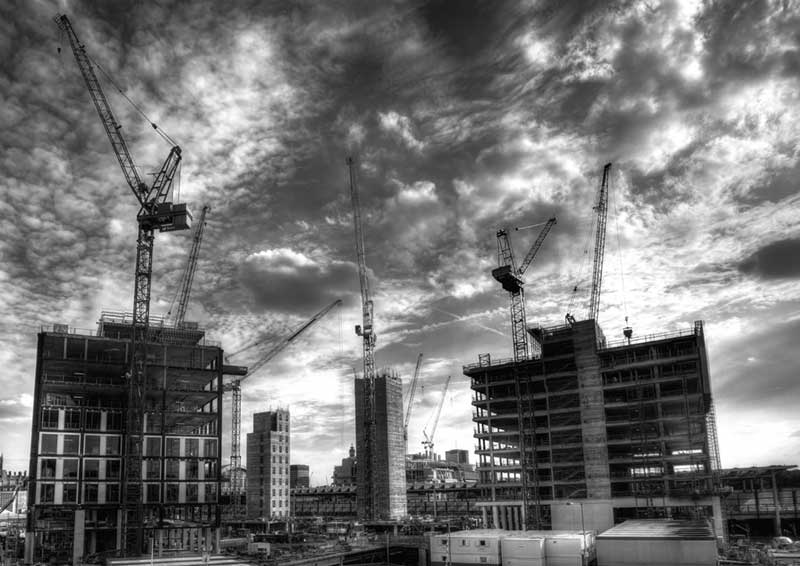Construction project
Contents |
[edit] What is a project?
A project is a series of related a tasks which when they are carried out in the correct order will lead to the completion of the project. Projects are temporary, generally resulting in the creation of a tangible product or outcome. This is as opposed to a programme, which is a series of interrelated projects that may be carried out repeatedly or continuously in order to support an ongoing process.
For more information, see Project v programme.
[edit] What is a construction project?
A construction project, sometimes just referred to as a ‘project’, is the organised process of constructing, renovating, refurbishing, retrofitting or adapting a building, or other built asset such as a tunnel or bridge.
For more information see: Construction works.
The project process typically starts with an overarching business requirement which is then developed through the creation of a brief, feasibility studies, option studies, design, financing and construction.
For more information see: Project stages.
Construction projects are typically one off's (particularly in the UK). That is, a project team, brief and financing are put together to produce a unique design that delivers a single project. Once the project is complete the team is disbanded and sometimes will not work together again. This can make it difficult to develop ideas or relationships, and so lessons learned are often not carried forward to the next project. The exceptions to this are repeat developers such as supermarket chains, housebuilders, and so on.
[edit] Who is involved in construction projects?
Typically, a construction project comprises many smaller projects which require a wide range of different disciplines working in collaboration. Large numbers of people are involved on a typical construction project, with the structure and composition of the project team usually changing through its duration. Projects may be coordinated by a project manager (or by a lead consultant) who is supported by professionals such as an architect, engineer, cost consultant and so on.
For more information, see Project team.
There will also be a range of suppliers, including contractors, sub-contractors, manufacturers and so on.
For more information see: Supply chain.
This separation of project roles into different disciplines, and contractual arrangements that further separate the client, consultants, contractors and subcontractors can make construction projects adversarial. This can result in conflict, opposition, confrontation, dispute and even hostility.
Solutions that have been put forward to combat the adversarial nature of construction projects include:
- Partnering and collaborative contracts such as NEC
- Alternative dispute resolution.
- Careful consideration of selection criteria.
- Integrated supply teams.
- Fair payment practices
- Other collaborative practices.
For more information, see Adversarial behaviour in the UK construction industry.
There will also be a number of third parties involved in construction projects, such as neighbours, local authorities, funders, insurers, unions, customers and so on.
For more information see: Third party dependencies and Stakeholders.
[edit] What permissions are required for construction projects?
A number of permissions are generally required for construction projects. These may be required before construction begins, during the construction works, and before the completed project is occupied. Examples include planning permission, building regulations approval, licensing and so on.
For more information see: Permissions and What approvals are needed before construction begins.
[edit] Public v private construction projects
Projects may be public, or private:
- A 'public project' is one that is financed by the government and is typically owned, and may be operated by the government. This can include major infrastructure works such as roads, bridges, dams, railways, tunnels, and so on, or public facilities such as hospitals, schools, prisons, libraries, leisure centres, and so on. For more information, see Public project definition.
- A ‘private project’ is one that is financed, controlled or commissioned by a private party, i.e. one that is not a government. Private parties can include individuals, corporations, charities, privately-funded institutions, schools, hospitals, and so on.
Some projects involve both public and private entities. Public Private Partnerships (PPPs) are a very broad range of partnerships in which the public and private sectors collaborate for some mutual benefit, which can include the completion of a construction project.
[edit] Related articles on Designing Buildings
Featured articles and news
Infrastructure that connect the physical and digital domains.
Harnessing robotics and AI in challenging environments
The key to nuclear decommissioning and fusion engineering.
BSRIA announces Lisa Ashworth as new CEO
Tasked with furthering BSRIA’s impressive growth ambitions.
Public buildings get half a million energy efficiency boost
£557 million to switch to cleaner heating and save on energy.
CIOB launches pre-election manifesto
Outlining potential future policies for the next government.
Grenfell Tower Inquiry announcement
Phase 2 hearings come to a close and the final report due in September.
Progress from Parts L, F and O: A whitepaper, one year on.
A replicated study to understand the opinion of practitioners.
ECA announces new president 2024
Electrical engineer and business leader Stuart Smith.
A distinct type of countryside that should be celebrated.
Should Part O be extended to existing buildings?
EAC brands heatwave adaptation a missed opportunity.
Definition of Statutory in workplace and facilities management
Established by IWFM, BESA, CIBSE and BSRIA.
Tackling the transition from traditional heating systems
59% lack the necessary information and confidence to switch.
The general election and the construction industry
As PM, Rishi Sunak announces July 4 date for an election.
Eco apprenticeships continue help grow green workforce
A year after being recognised at the King's coronation.
Permitted development rights for agricultural buildings
The changes coming into effect as of May 21, 2024.























Comments
[edit] To make a comment about this article, click 'Add a comment' above. Separate your comments from any existing comments by inserting a horizontal line.